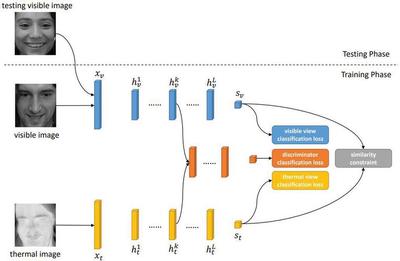Currently, fusing visible and thermal images for facial expression recognition requires two modalities during both training and testing. Visible cameras are commonly used in real-life applications, and thermal cameras are typically only available in lab situations due to their high price. Thermal imaging for facial expression recognition is not frequently used in real-world situations. To address this, we propose a novel thermally enhanced facial expression recognition method which uses thermal images as privileged information to construct better visible feature representation and improved classifiers by incorporating adversarial learning and similarity constraints during training. Specifically, we train two deep neural networks from visible images and thermal images. We impose adversarial loss to enforce statistical similarity between the learned representations of two modalities, and a similarity constraint to regulate the mapping functions from visible and thermal representation to expressions. Thus, thermal images are leveraged to simultaneously improve visible feature representation and classification during training. To mimic real-world scenarios, only visible images are available during testing. We further extend the proposed expression recognition method for partially unpaired data to explore thermal images’ supplementary role in visible facial expression recognition when visible images and thermal images are not synchronously recorded. Experimental results on the MAHNOB Laughter database demonstrate that our proposed method can effectively regularize visible representation and expression classifiers with the help of thermal images, achieving state-of-the-art recognition performance.
